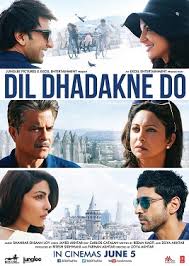Sometimes, a vacation reveals more about family dynamics than expected, and that’s exactly what happens in this star-studded family drama. Dil Dhadakne Do, directed by Zoya Akhtar, brings together a stellar ensemble cast featuring Anil Kapoor, Shefali Shah, Priyanka Chopra, Ranveer Singh, and Anushka Sharma. Set aboard a luxurious cruise ship, the film takes the audience on an emotional voyage through the lives of the wealthy Mehra family. Released in 2015, the film blends drama, comedy, and romance, offering a sharp critique of societal expectations while maintaining a lighthearted tone. The Mehra family embarks on this trip in the hopes of celebrating a milestone, but what unfolds is a deeper exploration of familial pressures, unspoken desires, and individual dreams, set against the picturesque backdrop of the Mediterranean.
At the heart of the story are Kamal and Neelam Mehra, played by Anil and Shefali, a wealthy couple with a dysfunctional marriage. They organize a lavish cruise for their 30th wedding anniversary, bringing together close friends and family. Priyanka plays Ayesha, their independent daughter trapped in an unhappy marriage, while Ranveer stars as Kabir, their carefree son who is expected to take over the family business but dreams of being a pilot. As the ship sails through stunning locations, long-buried tensions between family members come to the surface. Kabir’s growing romance with Farah (Anushka), a dancer on the cruise, and Ayesha’s struggle to break free from societal norms drive much of the narrative. The film doesn’t just focus on the Mehra family but also weaves in the lives of other passengers, creating a broader portrait of relationships and human desires.
One of the most compelling aspects of the film is the acting, especially the performances of Priyanka and Ranveer. Priyanka portrays Ayesha with a quiet strength, capturing the internal conflict of a woman who outwardly seems to have it all but is deeply unhappy. She navigates the complexities of her character with grace, making Ayesha’s struggle for independence relatable and poignant. Ranveer, on the other hand, brings a vibrant energy to Kabir. His journey from being a carefree, slightly lost young man to someone who takes charge of his destiny is both engaging and heartfelt. The chemistry between the siblings, Ayesha and Kabir, is one of the highlights of the film. Their conversations reflect the unspoken understanding between siblings, and they often act as each other’s emotional anchors. Anil and Shefali are equally brilliant, portraying the layers of a deteriorating marriage with a mix of bitterness, humor, and realism. Anushka as Farah adds a refreshing dimension to the film, though her role is more of a catalyst for Kabir’s personal growth rather than a fully fleshed-out character.
Zoya Akhtar’s direction stands out for its ability to balance multiple storylines without losing focus. She effectively uses the confined setting of the cruise ship to heighten the intensity of the characters’ interactions, making the ship itself feel like a character in the story. The scenes are crafted with elegance, and the cinematography by Carlos Catalan captures the beauty of the Mediterranean, contrasting the opulence of the Mehra family’s world with the emotional turbulence they experience. The editing keeps the pace fluid, with the narrative moving smoothly between different characters’ arcs. Akhtar’s ability to portray the intricacies of family dynamics, combined with her sharp commentary on societal expectations, makes the film resonate on a deeper level.
Shankar-Ehsaan-Loy’s music complements the film’s tone beautifully, with songs like “Gallan Goodiyan” and “Pehli Baar” adding energy and charm to the narrative. The upbeat tracks lighten the mood, especially during moments of tension, while the background score subtly underscores the emotional beats of the film. “Gallan Goodiyan,” in particular, is a standout moment in the film, with the entire cast participating in a single-take song sequence that captures the joy and chaos of a family celebration. The film’s use of music is not just for entertainment but also serves to reveal the underlying emotions of the characters. Whether it’s Kabir’s budding romance or Ayesha’s moments of introspection, the music helps to deepen the audience’s connection with the characters.
Another important aspect of the film is its costume design, which plays a key role in defining the characters. Ayesha’s chic, professional wardrobe reflects her successful business persona, while Kabir’s laid-back style mirrors his carefree nature. Neelam’s extravagant outfits symbolize her desperate attempt to maintain appearances, while Kamal’s sharp suits reflect his patriarchal position. The film’s costumes, designed by Arjun Bhasin, are not just visually appealing but also tell a story about each character’s personality and social standing. The attention to detail in the costumes adds an extra layer of realism to the characters and their world.
While the film excels in many areas, it does have a few shortcomings. At times, the film’s critique of societal expectations and family obligations feels a bit heavy-handed. The message is clear, but some moments lack subtlety, as characters explicitly voice their frustrations instead of allowing the audience to infer their struggles. Additionally, the film’s resolution feels somewhat convenient, with certain conflicts wrapping up more easily than one might expect, given the complexity of the issues presented. However, these flaws do little to detract from the overall enjoyment of the film, which remains engaging throughout.
Overall, Dil Dhadakne Do is a well-crafted film that balances humor and drama while providing a thoughtful look at family dynamics. Zoya’s direction, combined with strong performances from the cast, elevates the film beyond a typical family drama. The movie’s visual appeal, engaging soundtrack, and nuanced performances make it a standout. For those who enjoy character-driven stories with a touch of humor and a reflection on societal norms, this film is a must-watch. It may not be groundbreaking, but it is heartfelt, beautifully executed, and offers a satisfying cinematic experience that resonates with anyone who has ever felt the weight of family expectations.







